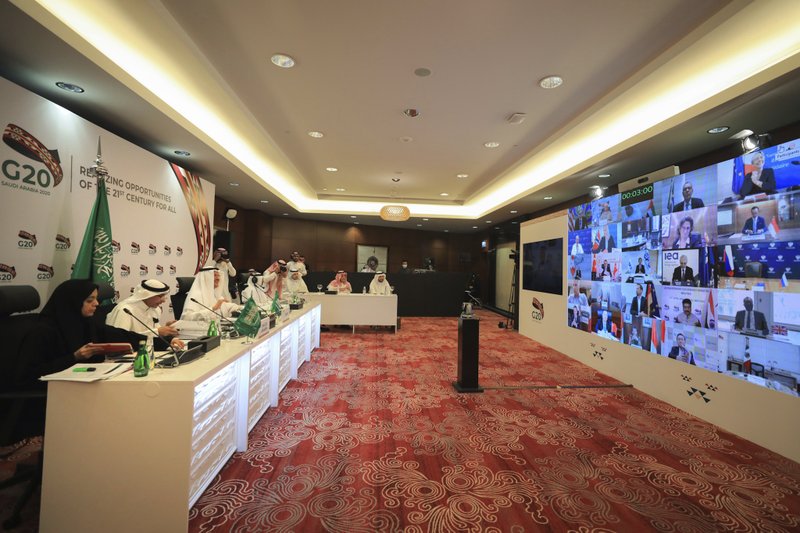DUBAI, United Arab Emirates -- OPEC members, Russia and other oil-producing nations Sunday finalized an unprecedented daily production cut of nearly 10 million barrels, or a tenth of the global supply, in hopes of boosting crashing prices, officials said.
The cartel and other nations agreed to allow Mexico to cut only 100,000 barrels a day, a sticking point for an accord initially reached Friday after a marathon videoconference involving 23 nations.
They reached the deal as international benchmark Brent crude trades at just over $31 a barrel and as American shale producers struggle.
Mexico's energy minister said on Twitter that the group of nations agreed to cut 9.7 million barrels a day beginning May 1. Energy officials from other countries shared similar information.
Video aired by the Saudi-owned satellite channel Al-Arabiya showed the moment that Saudi Energy Minister Prince Abdulaziz bin Salman, a son of King Salman, assented to the deal.
"I go with the consent, so I agree," the prince said, chuckling. His words drew a round of applause from those on the video call.
[CORONAVIRUS: Click here for our complete coverage » arkansasonline.com/coronavirus]
"The big Oil Deal with OPEC Plus is done. This will save hundreds of thousands of energy jobs in the United States," President Donald Trump said in a tweet. "I would like to thank and congratulate President Putin of Russia and King Salman of Saudi Arabia."
The Kremlin said Russian President Vladimir Putin held a joint call with Trump and King Salman to express support for the deal. It also said he spoke separately with Trump about the oil market and other issues.
With the coronavirus paralyzing air and ground travel, demand for gasoline is collapsing and crude prices have plunged to 18-year lows. That threatened the future of the U.S. shale industry and the stability of oil-dependent states, while piling more challenges onto central banks fighting the fallout from the pandemic.
The oil market is now far more worried about consumption than supply. OPEC acknowledged the challenge, with its chief warning ministers that demand fundamentals were "horrifying."
The so-called OPEC+ group of OPEC members and other nations failed in March to reach an agreement on production cuts, sending prices tumbling. Saudi Arabia sharply criticized Russia days earlier over what it described as comments critical of the kingdom, which finds itself trying to appease Trump, a longtime OPEC critic.
Even U.S. senators had warned Saudi Arabia to find a way to boost prices as American shale firms face far higher production costs.
"[The Saudis] spent over the last month waging war on American oil producers while we are defending theirs. This is not how friends treat friends," said Sen. Kevin Cramer, a Republican from North Dakota, before the oil producers' deal. American troops have been deployed to the kingdom for the first time since the Sept. 11, 2001, terrorist attacks over concerns of Iranian aggression amid regional tensions.
"Frankly, I think their actions have been inexcusable and they are not going to be easily or quickly forgotten," Cramer said of the Saudis.
U.S. producers have already been reducing output and are on track for a production decline of 2 million to 3 million barrels per day, according to the U.S. Department of Energy.
The American Petroleum Institute lauded Sunday's global pact, saying it will help get other nations' oil production to follow the lead of U.S. producers that are trying to adjust to a "historic drop in demand."
Iran's Oil Ministry confirmed the 9.7 million-barrel global cut for May and June and said the agreement would have Mexico reduce its output by 100,000 barrels a day for those two months.
Iranian Oil Minister Bijan Zanganeh also told state television that Kuwait, Saudi Arabia and the United Arab Emirates would cut another 2 million barrels of oil a day between them on top of the deal. The three countries did not immediately acknowledge the cuts themselves, though Zanganeh attended the videoconference.
Nigeria's Petroleum Resources Ministry said other planned cuts would stand in the deal, meaning an 8 million-barrel-per-day cut from July through the end of the year and a 6 million-barrel cut for 16 months beginning in 2021.
"This will enable the rebalancing of the oil markets and the expected rebound of prices by $15 per barrel in the short term," the ministry said.
Together, the U.S., Brazil and Canada will contribute another 3.7 million barrels in reductions as their production declines.
Mexico had initially blocked the deal, but President Andres Manuel Lopez Obrador said Friday that he had agreed with Trump that the U.S. will compensate for what Mexico cannot add to the proposed cuts.
Analysts offered cautious praise for the deal reached Sunday.
"The pure size of the cut is unprecedented, but, then again, so is the impact the coronavirus is having on demand," said Mohammed Ghulam, an energy analyst at Raymond James.
But he and others worried it may not be enough.
"This is at least a temporary relief for the energy industry and for the global economy. This industry is too big to be let to fail, and the alliance showed responsibility with this agreement," said Per Magnus Nysveen, head of analysis at Rystad Energy. "Even though the production cuts are smaller than what the market needed and only postpone the stock building constraints problem, the worst is for now avoided."
But Saudi Arabia's Prince Abdulaziz said he was more than happy with the historic production cut.
"We have demonstrated that OPEC+ is up and alive," he told Bloomberg News minutes after he clinched the deal.
Abdulaziz, who declared himself "sleepless and exhausted" after nearly a week of conference calls, said the deal was "unbelievable" and that over time it would reduce the oversupply in the market.
Information for this article was contributed by Jon Gambrell, Amir Vahdat, Matt O'Brien, Cathy Bussewitz and Jim Heintz of The Associated Press; and by Javier Blas, Grant Smith and Salma El Wardany of Bloomberg News.
A Section on 04/13/2020
